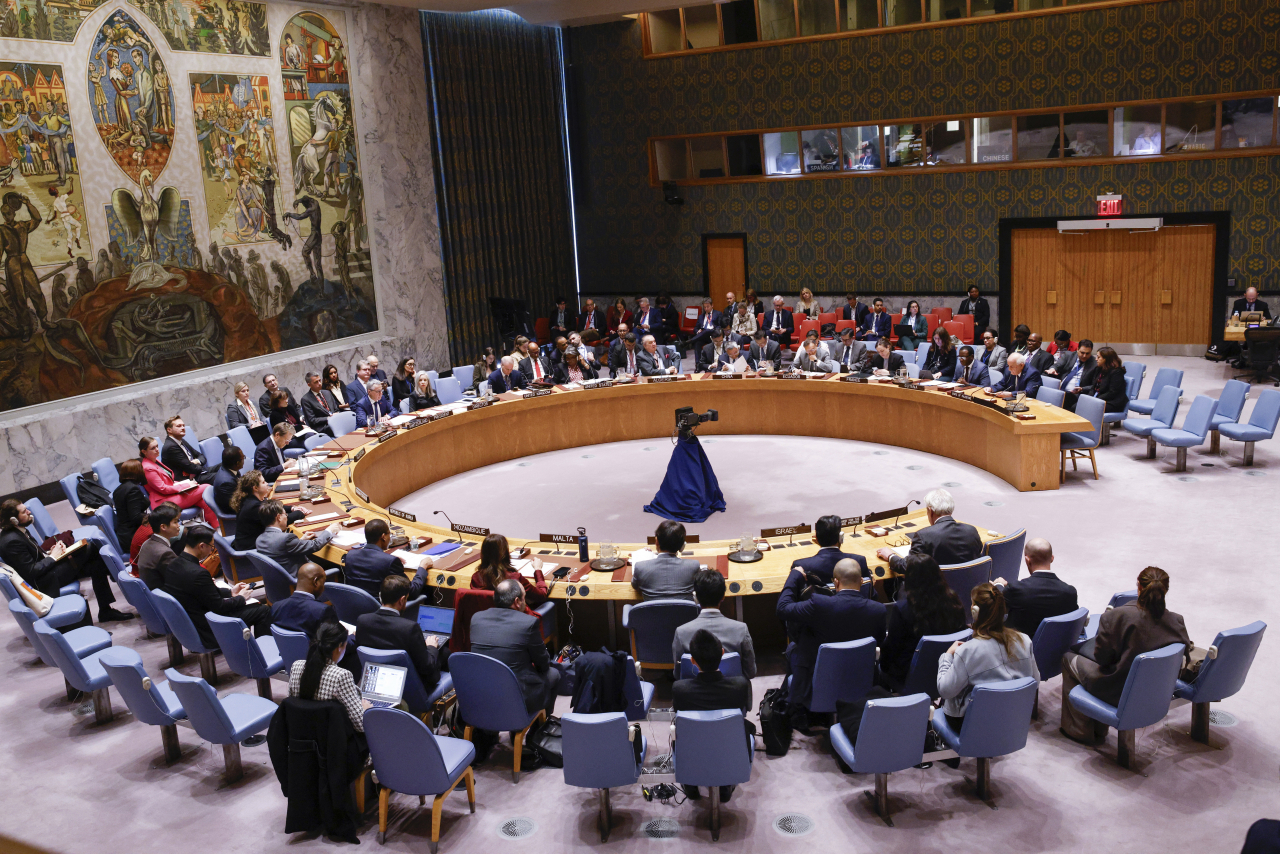 |
General view of the room is seen while Riyad Mansour, Palestinian Ambassador to the UN speaks during a United Nations Security Council meeting on the situation in the Middle East, including the Palestinian question at U.N. headquarters in New York, Tuesday. (AP) |
South Korean and US envoys delivered a stark rebuke to Kim Jong-un’s regime in an unusually tense meeting at the UN Security Council on Wednesday, warning that North Korean soldiers deployed against Ukraine could "return in body bags."
The sharp, intentionally undiplomatic rhetoric underscored the allies' deepening alarm over Pyongyang’s expanding military alliance with Moscow, which has escalated from arms transfers to the actual deployment of North Korean forces -- a development that became a key agenda item at the Security Council meeting.
South Korean Ambassador to the UN Hwang Joon-kook condemned Pyongyang’s disregard for its young soldiers, labeling North Korea's treatment of its own people as "expendable" and unforgivable.
"The reality is that Russia needs more soldiers to feed its war machine. And we all know what will happen to these ill-fated North Korean soldiers once they are deployed to the deadly battlefield," Hwang said, citing an assessment from NATO that over 600,000 Russian soldiers have been killed or wounded since the start of Russia's war against Ukraine in February 2022.
"As legitimate military targets, they will end up as mere cannon fodder, while the wages they are supposed to receive from Russia will end up squarely in Kim Jong-un's pocket. I do personally feel pity for these soldiers as a fellow Korean," Hwang added, referencing the North Korean leader by name, and omitting his official title.
Britain’s UN Ambassador Barbara Woodward took another swipe at "a desperate and impoverished Russia," stating, "Instead of sending other countries’ sons to die for the imperialistic whims of one man, they should end the war now."
Hwang also highlighted that North Korea’s dispatch of troops to Russia for training constitutes a clear violation of multiple UN Security Council Resolutions. Specifically, Resolutions 1,718, 1,874 and 2,270 prohibit any transfer of weapons, ammunition, training, advice, services or assistance to or from North Korea, as well as the hosting of trainers, advisers or officials for military training purposes.
Deputy US Ambassador to the UN Robert Wood concurred that Russia’s training of North Korean soldiers with arms or related materiel violated three resolutions that Russia supported as a permanent Security Council member.
The US estimates that around 10,000 North Korean soldiers are training in eastern Russia, with some having already moved closer to Ukraine. South Korea has warned that their deployment to the battlefield could come sooner than later.
Heated debate
Wood delivered a pointed warning directly to North Korean leader Kim Jong-un, raising his hand and responding in a firm, emphatic tone immediately after North Korean UN Ambassador Kim Song’s remarks on the council floor.
"Should DPRK's troops enter Ukraine in support of Russia, they will surely return in body bags. So I would advise Chairman Kim to think twice about engaging in such reckless and dangerous behavior," Wood said, referring to North Korea's official name, the Democratic People's Republic of Korea.
Kim Song asserted that North Korea and Russia have the right to develop comprehensive bilateral relations in all areas, including the military, with recognized international norms and the Treaty on Comprehensive Strategic Partnership signed by the two countries in June.
"If Russia’s sovereignty and security interests are exposed to and threatened by continued dangerous attempts of the United States and the West, and if it is judged that we should respond to them with something, we will make a necessary decision," Kim told the council.
Russia's UN Ambassador Vassily Nebenzia dismissed reports of North Korean troop deployments to Russia as "mere assertions" without "any convincing evidence," but questioned why North Korea should not be allowed to provide military support to Russia, just as NATO allies support Ukraine.
"Why are the United States and its allies trying to impose on the whole world the flawed logic that they have the right to help the Zelenskyy regime by harnessing NATO’s entire military and intelligence potential, whereas Russia's allies have no right to do similar things?" Nebenzia said.
Neither Russia nor North Korea explicitly admitted to the deployment of North Korean troops to Russia.
Chinese Ambassador to the UN Geng Shuang made no mention of North Korean troop deployments to Russia, instead reiterating the country’s position that "China has always believed that maintaining peace and stability on the Peninsula and promoting a political solution to the Peninsula issue serve(s) the common interests of all parties."
Wood denounced China's acquiescence.
"The other troubling factor here is that this destabilizing activity has the support of two permanent members of the Security Council, and we all know, too, the countries to which I'm referring," Wood said. "And these destabilizing activities are a major threat to peace and security, not only in Europe but in the Indo-Pacific."
North Korea launched an intercontinental ballistic missile Thursday morning, just hours after the tense UN Security Council meeting held Wednesday afternoon, which followed the annual Security Consultative Meeting -- a major defense ministerial meeting between South Korea and the US -- held in Washington earlier that day.







![[Today’s K-pop] Blackpink’s Jennie, Lisa invited to Coachella as solo acts](http://res.heraldm.com/phpwas/restmb_idxmake.php?idx=644&simg=/content/image/2024/11/21/20241121050099_0.jpg)